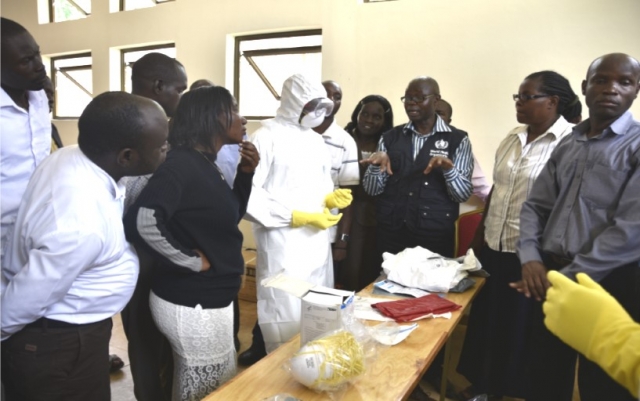
The fourth meeting of the Emergency Committee convened by the WHO Director-General under the International Health Regulations (IHR) 2005 regarding the Ebola virus disease (EVD, or “Ebola”) outbreak in West Africa was conducted with members and advisors of the Emergency Committee on Tuesday, 20 January 2015.
This meeting was convened to review, in accordance with IHR provisions, whether the event continued to constitute a Public Health Emergency of International Concern and, if so, whether this warranted an extension or revision of the three -month date of the expiration of the temporary recommendations, which were first issued on 8 August 2014 and extended on 22 September 2014 and 23 October 2014.
Developments since the Committee’s last meeting were reviewed, including the most recent epidemiological situation. The Committee noted that the number of Ebola cases is decreasing in all three of the most affected countries.
Since the previous meeting, three countries have declared the end of Ebola transmission: Spain, the United States of America, and Mali. One case was imported into the United Kingdom of Great Britain and Northern Ireland (UK), in a health care worker who returned from Sierra Leone and was asymptomatic on exit screening and during travel; she became ill after arrival in the UK.
The Committee expressed concern that additional measures affecting travel, transport and trade that go beyond the temporary recommendations have been put in place in more than 40 countries.
Current response and preparedness activities were reviewed, as well as recent scaling up of the response. Priorities and strategies for moving towards zero cases were presented.
Guinea, Liberia, Sierra Leone, Mali and UK provided an update on and assessment of the Ebola situation in their countries, including progress towards implementation of the temporary recommendations.
Even though a few cases have occurred outside the three most affected countries, the measures recommended appear to have been helpful in limiting further international spread, including the exportation of disease from the three most affected countries.
It was the unanimous view of the Committee that the event continues to constitute a Public Health Emergency of International Concern. The Committee reviewed the temporary recommendations previously issued and stated that all previous temporary recommendations should remain in effect.
The committee provided the following additional advice to the Director-General for her consideration in addressing the Ebola outbreak in accordance with the IHR.
Recommendations for the most affected countries (Guinea, Liberia, Sierra Leone)
The Committee strongly reiterated the previous temporary recommendation on exit screening and highlighted the value of exit screening in these three countries. Exit screening remains critical for minimizing the risk of exportation of Ebola cases. The three most affected countries should maintain robust exit screening until Ebola transmission is confirmed to have stopped in these countries. The Committee again urged affected countries to provide WHO regularly with the number of people screened at international airports and the outcomes of exit screening. The international community should support a sustainable approach to this exit screening.
Recommendations for countries sharing borders with Guinea, Liberia and Sierra Leone
These countries should be conducting active surveillance, including in border areas, and engaging in cross-border cooperation, information and asset sharing, and continued vigilance for new cases. National governments should empower local communities that have land crossings at shared national borders to be part of these activities.
Recommendations for all countries
The Committee reaffirmed the need to avoid unnecessary interference with international travel and trade, as specified in Article 2 of the IHR 2005. The Committee noted that more than 40 countries have implemented additional measures, such as quarantine of returning travellers and refusal of entry. Such measures are impeding the recruitment and return of international responders. They also have harmful effects on local populations by increasing stigma and isolation, and by disrupting livelihoods and economies.
The Committee concluded that the primary emphasis must continue to be on ‘getting to zero’ Ebola cases, by stopping the transmission of Ebola within the three most affected countries. This action is the most important step for preventing international spread. Complacency is the biggest risk to not getting to zero cases. Continued vigilance is essential.
The Director-General thanked the Committee members and advisors for their advice and requested their reassessment of this situation within three months or earlier should circumstances require.


